Interview: Mark Dooley Discusses His Documentary REPEAT ATTENDERS
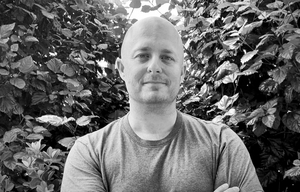
Director and producer Mark Dooley has just released Repeat Attenders, a direct look into the lives of musical theatre superfans in the form of a documentary.
Interviewing audience members from Broadway to the West End and from Germany to his native Australia, his film opens the doors to what the most extremes fans in theatre are willing to do to pursue their passion. We had a chat to discuss celebrity culture, toxic fandoms, obsession, and the inherent beauty and wholesomeness of the theatrical experience.
How did you get the idea for the documentary?
The idea came about because I was talking to a friend who was a dresser on Priscilla Queen of the Desert - we were having coffee, and I was asking about the superfans and asking him to tell me some stories. I noticed for the first time that I always do that with everyone that I meet within the industry. I thought 'There's definitely something there' - I keep doing it and I keep asking these questions, I'm so fascinated by it all. I wonder if I'm not the only person who's fascinated by it?
So I started doing some research, put the call out to the fandoms in the forums and had a great response. I felt that whenever I spoke about the idea I could really feel a very positive reaction from people. You know, you can have ideas for projects and you know straightaway when someone thinks it's a good idea or not. With this one, I always got that really extreme positive reaction, so I knew it was something I had to follow through and make it happen no matter what.
What's your background? Was it your first time shooting something like that?
My background is predominantly working in television. I've been a producer and director for reality, game shows, and factual shows. So I've got that storytelling experience. My interest in theatre made it easier to research the subject and have access to the industry. I knew what to ask and who to ask. Although it's my first feature film, filming and telling stories isn't new to me.
Documentaries have a different language to features - did you find it hard to stick to the format? What was your process?
The project evolved over the years. It started off as a passion project, something I wanted to do, stories I just wanted to tell. I thought that if I wasn't going to do it, it probably wouldn't get done. That was really how I got started. Then, over time, it grew and grew as more productions and more producers gave me access and allowed me to use footage, and all of those things fell into places. It grew along the way quite organically.
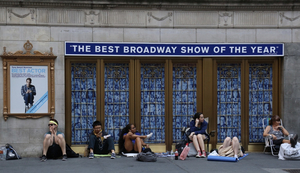
queue on Broadway
Then I met my distributer for Australia and New Zealand at a documentary conference and they signed up on the spot. That really meant that I needed to finish it - it was now something that I was legally obligated to get done. It was an unconventional process in that I shot part of it, then shot a little bit more, went into the editing, shot some more, went to the cut again. I think we went into post around three times just because money was so tight; whenever I could afford something, I would work on the film and reshape it. It wasn't a smooth research, shoot, cut, deliver process at all.
I'm glad it wasn't like that. If I had done it that way, I wouldn't have the ending that I have now with Gudrun [Mangel, Starlight Express superfan from Germany]. That only happened by the time we took down the second cut.
How long did it take from start to finish?
From the time that I actually came up with the idea, that was probably ten years ago. Filming the period that I met Gudrun, which is the last period of the shoot, that was six years.
You've invested a long time in it
Yeah, it took over my life for a long time. A lot of people don't realise the commitment involved when you're doing both roles - producer and director - there's very little time. I would very often, for three to four years, work all through the night several times a week, or be up at four just so I could be on the same time zone as America or the UK, and then I'd go off and work at my job. I'd come home and then continue working on the film. It's something I had to structure my entire life around to make it work.
You've interviewed people from different countries - do you think that nationality, upbringing, and background influence the way people approach a piece of theatre?
I think culturally, in terms of theatre, there are shows that don't work for certain cultures. The German production of Starlight Express is very German, and that production may not work in the West End. Something may work beautifully in the West End, but not work in America. That plays a big role in whether a show has a big success or not. I think what does tie different cultures together and has that connection is the presence of a universal theme we can all relate to; that's usually something that would mean that a show is a success, if the story is so relatable and so universal.
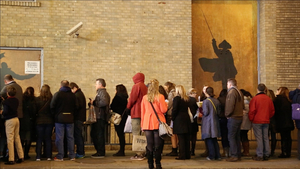
It's interesting, I was talking the other day about the different experiences of going to the theatre. At the theatre in Germany, when you walk in, it smells like a cinema because they sell popcorn and pretzels as snacks. It doesn't smell like a theatrical experience when you walk into the foyer.
In Australia, we have bigger theatres because we have more space. The tradition is of going to the theatre quite a bit earlier than when the show starts to have a drink at the bar and hang out there with the crowd, because there is room to do that. On Broadway, there isn't that much space to queue, to get into the theatre - it's a bit more compact. I think theatre is very different all over the world, but there are some shows that do make it universal.
What shows did you consider for your project? Did you have certain pieces in mind before you started?
No, I didn't have any shows in mind that I wanted to follow, it was all about the characters and the people and their stories. Whatever show they followed, that was the show that was going to be featured. Naturally, the shows that are mentioned in the film are are long-running shows; they open themselves up to being seen several times over many years.
A show that has just opened - say Moulin Rouge - it's not going to have as many repeat attenders because the run hasn't been that long, whereas Phantom is a completely different story. Hamilton has repeat attenders but they don't see it as many times because the tickets are quite expensive, so they're not going so many times. So I didn't really choose the shows, I chose the characters first.
What are your thoughts on going back to a show? Why do people do that?
I don't want to say too much about why people go back more than once, because that's really what the film is all about. The way I structured the story is for the audience to make up their own minds. A lot of it is observational - it's not me forcing a message down someone's throat or telling you what you should think or what a particular commentary means. For a lot of the repeat attenders I've met, their reasons are all very different.
For some people, it's because they want to see a particular cast member more than once; for others, it's because the tickets are the right price for them to go back and it's something they enjoy. There are many, many reasons, and I focused on those that the characters that are in the film have, why they do it.
Do you think different types of work attract different types of fans? Or would you say that all fans are the same?
I think that there are a lot of shows that do attract a particular fan or demographic, for sure. The Book of Mormon is very male, Avenue Q has a good balance between male and female audience members, Rock of Ages is very male as well. Of course there are shows that will attract a younger audience - Dear Evan Hansen is a show that a younger audience can relate to and connect with. But then I also think that sometimes shows just do their thing.
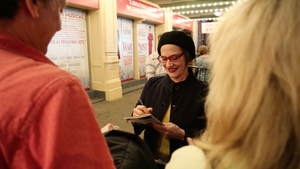
If I knew what made a show a success I'd be a billionaire, because I would create that show and it would just take off. There are so many elements to a production that you can't plan for, they just fit at the right time and connect with a particular city or a particular age group and fan and it takes off. Most shows tend to have a fanbase to them, and whether that's big or small is something that naturally happens.
Why do you think certain works are able to gather such massive fandoms in such a small amount of time? See Hamilton, for instance, or Cats in a non-social media age. What do you think is the secret?
Again, if I knew the secret... Fandoms are, at the end of the day, word of mouth. Successful shows do well because people are talking about them. They're waiting for tickets at the box office and people are talking in the queue saying "I'm really looking forward to this" - and if there's a fan in the queue who says they've seen it three times, that's all that audience member needs to know, they're going to buy their ticket no matter what. It's such an endorsement to that show if there's a superfan there, or someone who's seen it multiple times, a repeat attender.
Social media plays a big part now and producers are great at supporting fanbases as well, setting up those boundaries within the fandoms. This never used to be the case; it wasn't always like that. Now, producers very much acknowledge that they play a huge role. Accessibility to music also helps, and SIX is the best example I can think of where the music is definitely the thing that has made fans want to see the show. Before the pandemic happened, it was going on all over the world and productions were popping up everywhere.
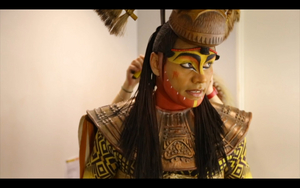
in The Lion King
It's all about how can that music and that show be connected to as many people as possible. I believe it's a combination of word of mouth, having a strong fandom, social media, great digital marketing, a great show, and a cast that's really popular. There are so many elements - if all those things come together, that can almost guarantee that it's a really great start to a production.
Where do you think criticism sits in all this? Do you think it matters?
I think it's interesting how critics play a major role in the success and sometimes failure of a production. They know how to analyse productions, they're extremely experienced in what makes something work and what makes something tick. One thing that upsets me when I read a review is that there is rarely any room for emotion, where the critic is saying "I felt this during the production". That's the thing that the audience want to know: what is it like, was it moving, was it funny, were you laughing out loud during the experience?
You rarely read that in a review, whereas for me I really want to know that. I want to know if this is a sad production - if I want to feel certain emotions, should I go see it? Breaking down the tempo of the music or the colour palette of the costumes or the scenery, that's not necessarily helpful to me as a potential ticket buyer.
Do you think celebrities or theatre-famous actors have an impact on building a fandom?
Yes, I think celebrities or very well-known theatre actors do help the success of the show, because out of it people talk about who's performing in it, who they want to see in it... So, this also plays a huge role. Having a social media following is very important for the cast too. For some shows, they announce the cast and you think "Oh, why did they put that person in that role?!", but then I always remind myself that it's because that show won't sell otherwise, it needs to sustain itself with a certain capacity to survive. If that cast is not in it and you don't know anyone in it, the percentage of ticket sales is going to drop. So, yeah, it's very important.
Do you think there's such a thing as toxic fandom? Where do you think the limit lies?
The film does touch on the darker side of a fandom. The reason I wanted to focus on that is really just to say that there are boundaries that need to be put in place. The producers might decide that there will be no stage door, that there will be barriers at the stage door, that there might be things to expect, security might make an announcement at the stage door...
I wanted to give an example of what happens when you cross the line - how easily that can happen, and what the consequences are. Without spoiling too much, there's a man in the film who was stalking a star who was in Beauty and the Beast, Debbie Gibson, and he went to jail for that. The other side of the fandom I also touch on is the bullying and hate online that comes from some of the fans in theatre - not all of them, the majority of them are amazing, supportive, and a great positive community. I show examples of what behaviours should be celebrated in a fandom and the ones that should be eradicated.
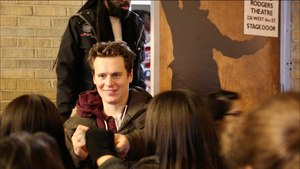
the Hamilton stage door on Broadway
When do you think being a fan becomes unhealthy?
I think it's very easy for a fan to cross those lines and not to have any boundaries, not to know what's right and what's wrong. If you don't have anyone telling you what the theatre etiquette is or what the stage door etiquette is, it's very easy for that to happen. You're meeting someone you've seen on stage: you might already admire them, they might make you happy because you see them on stage, and then you get to meet them in person. That is very exciting for some people.
But there are rules in society and certain societal norms that we should stick to, in order to make sure that everyone is safe and comfortable. As long as you know what they are - and the fandom is great in policing themselves in that way - that's fine. Of course, there are some people who slip through the cracks and won't be aware, or won't understand why their behaviour is considered a bit antisocial.
Why do you think people become so obsessed with shows and people? Is connecting to something or someone purely personal?
The film gives the examples and the reasons of its characters as to why they follow certain shows and what's behind that. A lot of the feedback I get is from people who weren't aware of the show they were following and why they were following it at the time, so it's made them look back and reflect on what was going on in their lives, why they needed to care about it, to think about it, to be involved in it.
There are many reasons why people become obsessed and focused on a particular show. "Obsession" has a negative connotation to it, and it shouldn't as long as those boundaries are in place and it's safe on all sides for those involved.
Do you think there's a slant of sexism when we talk about fandoms? Men are allowed to be invested in sports and even cry for their teams, but when women (especially younger women) do the same for a piece of entertainment, it's suddenly something to be dismissed and looked down upon.
I've never had fans discussing sexism with me - an issue of sexism within the fandom or any imbalance in it. And I'm talking about the musical theatre fandom, so this might be prevalent in others. The musical theatre fandom is predominantly a female audience anyway, with loads of men who love it too. It's a tricky one, because if you're comparing the musical theatre fandom to, say, Manchester United fans, you're also talking about arts versus sports, so is the discriminations and the lack of interest in the musical theatre fandom due to its being predominantly female or is it because it's about the arts?
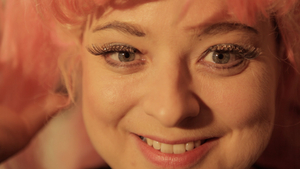
Sport all around the world gets a lot more funding, a lot more credit, a lot more focus and attention. Those sports stars are idolised and have been so for years for their athleticism. I think that within musical theatre, there are actors that should be idolised equally for their athleticism on stage. It's one of those age-old forms of discrimination - not giving the arts the same attention as sport. I don't really like getting involved in these sorts of arguments, simply because I am not female, so I don't have any experience of that. It's certainly made me more aware to look out for these issues, but it's never popped up in my research.
What kind of demographics did you interview for your documentary?
I've spoken to everyone. The beauty of the documentary is that age, look, background - they don't matter, it's not about any of that. When you're casting a drama or a comedy series obviously those are important - there's a certain look required for a casting - but for a documentary, it needs to be all about the story. I spoke to people who were new fans, who were just getting into theatre, and people who've been following shows for years. Because of the subject, most of the repeat attenders with extreme numbers have been seeing shows for 30 or 40 years, so they were older than the others.
Do you think age matters? Does the approach to a piece of theatre change depending on the age of the fan?
I guess so, but it's not something I've really focused on. I think it goes back to what I was saying before about younger generations tending to attach themselves to different shows. For a musical, it's all about the themes and the story. The sets, and costumes and music are all fantastic elements, but if you can't relate to that story in any way, if it's not something that connects to your emotions, then there's no point. I find that in shows like Les Mis or Wicked, they're massive shows with massive appeal because the stories within them cross generations.
What's the aim of your documentary?
I started working on this film with the hope that, very simply, people would go see more musicals. I hoped to be able to show the viewers that theatre is accessible, relatable. I wanted to show that you might have seen something you didn't like, but go see another one and maybe ask other people and get them to recommend something you should see. Put simply, I would like people to see more theatre - that would be a great outcome.
But also I wanted people to get an understanding of repeat attenders; the first reaction to someone who's seen a show 80 times is shock. "Oh my god, I can't believe that!" is the first think they'll say, judging that person for their behaviour. This can cause shame and embarrassment; that person might stop wanting to share that part of their life. I guess what I wanted for the film was to show that there's nothing wrong with this hobby, this pastime. Even if you see it multiple times. As long as it's not hurting anybody. What do you care about what they do with their own time with their own money?
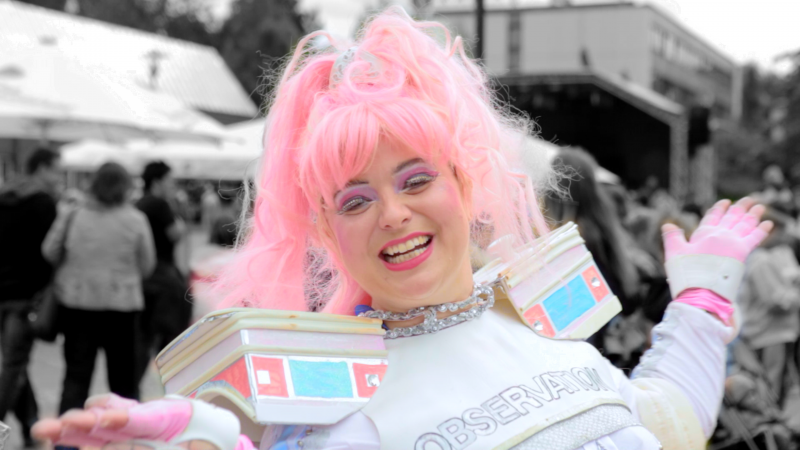
What's something that struck you throughout the process?
I guess what shocked me the most was that so many people don't know why they go back to a certain show - they'd never really considered that before, or thought about that. It was really surprising to me because this might be someone who's seen a show 100 times, they're spending tons of money and going back repeatedly, they're sitting in a theatre multiple hours each time, there might even be travel expenses involved.
A lot of them didn't know why they did it, or why this particular show. That's really our subconscious doing overtime and essentially driving you towards these things that you love - because it's good for you and you enjoy it, you get all those happy emotions that you need from it. What's sending you back there again and again? I know that has certainly happened to me in some down times in my life - I've felt drawn towards the world of theatre to cheer myself up.
It's absolutely a tonic for not feeling so great and, sadly, right now we're in desperate need of that tonic. This will definitely have an impact on people's mental health. Hopefully, our theatres will be up and running in no time so we can all enjoy our hobbies once again.
You can watch the trailer of Repeat Attenders and rent the documentary here
All photographic credit to the production
Comments
Videos

